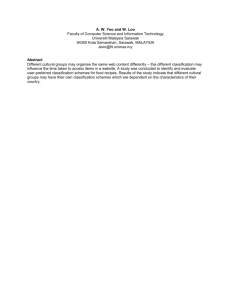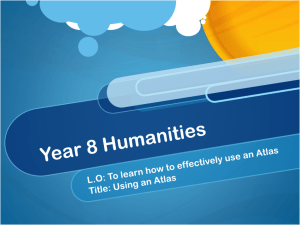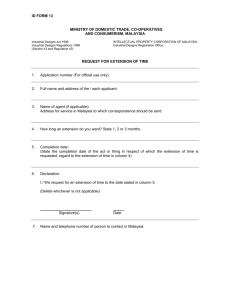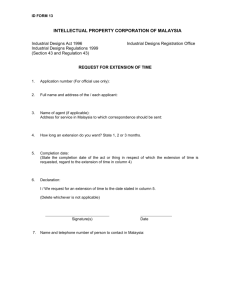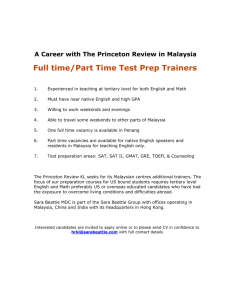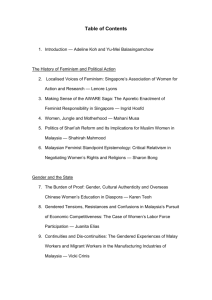LESSON 1
advertisement
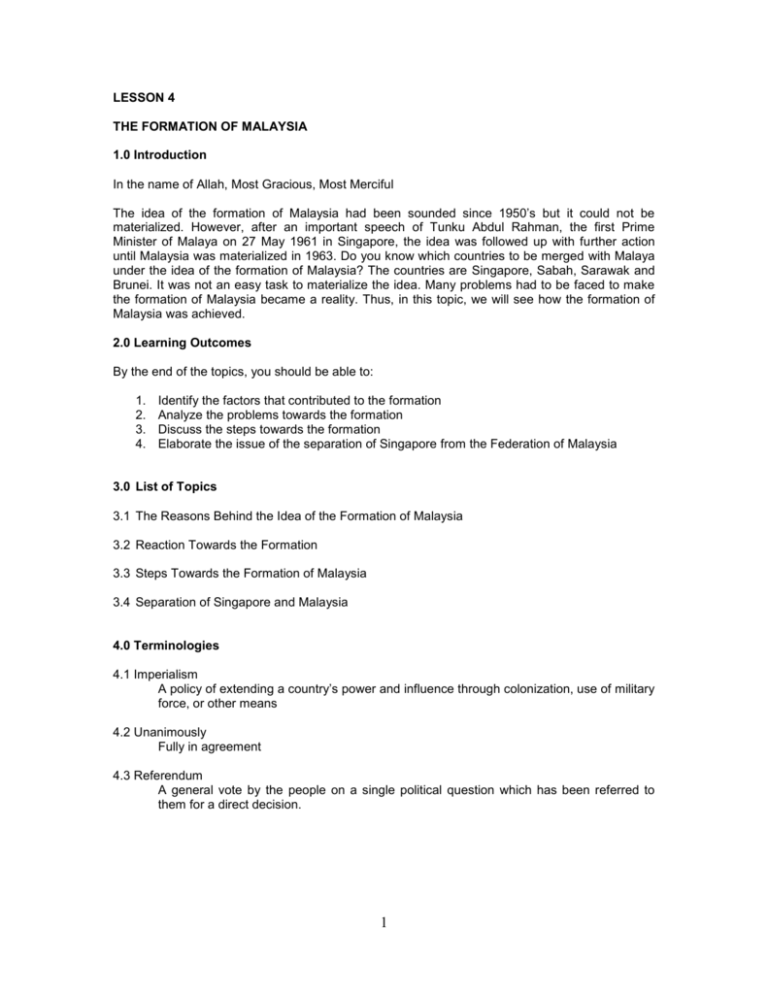
LESSON 4 THE FORMATION OF MALAYSIA 1.0 Introduction In the name of Allah, Most Gracious, Most Merciful The idea of the formation of Malaysia had been sounded since 1950’s but it could not be materialized. However, after an important speech of Tunku Abdul Rahman, the first Prime Minister of Malaya on 27 May 1961 in Singapore, the idea was followed up with further action until Malaysia was materialized in 1963. Do you know which countries to be merged with Malaya under the idea of the formation of Malaysia? The countries are Singapore, Sabah, Sarawak and Brunei. It was not an easy task to materialize the idea. Many problems had to be faced to make the formation of Malaysia became a reality. Thus, in this topic, we will see how the formation of Malaysia was achieved. 2.0 Learning Outcomes By the end of the topics, you should be able to: 1. 2. 3. 4. Identify the factors that contributed to the formation Analyze the problems towards the formation Discuss the steps towards the formation Elaborate the issue of the separation of Singapore from the Federation of Malaysia 3.0 List of Topics 3.1 The Reasons Behind the Idea of the Formation of Malaysia 3.2 Reaction Towards the Formation 3.3 Steps Towards the Formation of Malaysia 3.4 Separation of Singapore and Malaysia 4.0 Terminologies 4.1 Imperialism A policy of extending a country’s power and influence through colonization, use of military force, or other means 4.2 Unanimously Fully in agreement 4.3 Referendum A general vote by the people on a single political question which has been referred to them for a direct decision. 1 5.0 Topics 5.1 The Reasons behind the Idea of the Formation of Malaysia 5.1.1 Presentation The idea was to unify Singapore, Sabah, Sarawak and Brunei with Malaya to be under one nation which is called Malaysia. Do you know that there are several reasons behind the idea to form Malaysia? Among them are: a) Independence through the merger For your information, only Malaya has got independence after 31 August 1957. Thus, by merging with Malaya, Singapore, Sabah, Sarawak and Brunei would also get their independence from the British. b) Collective Efforts to Contain Communists Activities All countries were not yet free form the communists’ threats. Thus, by the merger, the task to fight the communists would be greater and stronger rather than fighting the communists alone. c) Ethnic Balance and Unity This reason was emphasized very much by Tunku Abdul Rahman but not by Singapore. Since Singapore emphasized to merge with Malaya, Tunku had to find a way to balance up the ethnic composition as majority of Singapore were Chinese. Thus, Tunku emphasized to include Sabah, Sarawak and Brunei in the formation of Malaysia. d) Economic Cooperation for Development By the merger, it would be able to foster economic growth for the country and hence, ensuring progress for the people. With the collective revenue from various sources of each individual country, it would enable the country to speed up its economic growth as the economic potential in a country could be further developed. Thus, it would bring prosperity to the people. 5.1.2 Activities The formation of Malaysia had advantages and disadvantages. Do you agree with this statement? Give your argument. 5.2 Reaction towards the Formation 5.2.1 Presentation Forming Malaysia was not an easy task. The idea received various reactions from the leaders and the people. Let us see the reactions towards the idea: a) Malaya The idea was generally accepted but there was also disagreement about the idea. There was fear among UMNO leaders about the interests of the Malays if Singapore be part of Malaysia. However, the fear was rested by the suggestion to include Sabah and Sarawak in the merger. While, PAS (Malaysian Islamic Party) was said to disagree with the idea because the Malays would be left out if Malaysia was established. 2 b) Singapore The idea was well-accepted. The leaders and people were interested with the idea as Singapore would be free from the British control if they joined Malaysia. However, there was also apposition posted by United People’s Party (UPP), a socialist party but it did not Lee Kuan Yew to proceed with merger. c) Brunei Its leaders interested however the people did not unanimously support the idea. The people preferred Brunei to get independence on its own rather than joining Malaysia. As a result of armed rebellion that was led by Ahmad M. Azahari, the king of Brunei had to forget the idea in order to restore peace in the country. d) Sabah and Sarawak The reaction was most encouraging. The idea was well-accepted by the leaders and the people as they realized that they would be free from the British imperialism if they joined the Federation. However, there were concerns surrounded them. Firstly, there was fear that the people from the Peninsular would dominate them politically. Secondly, the non-Malays feared that they would be discriminated. Thirdly, the Chinese feared that they would be left out in the economic competition with the Chinese from Singapore. However, all the fears were removed after Tunku himself made series of rally to explain the concept of the formation. e) British Government In general, the British accepted the idea even though they realized that they would lose some more countries under their control. Behind their acceptance, they actually wanted to secure their investments and economic interests in this region. 5.2.2 Reaction from Indonesia and Philippines Indonesia and Philippines strongly opposed the idea. Indonesia through its president, Sukarno, opposed the idea because it would fail his scheme to form a greater Indonesian empire or known as Indonesia Raya. He also looked at the formation of Malaysia as a new political structure introduced by the British to strengthen their position in this region. This new political structure would ignore Indonesia’s interests. The peak of Indonesia’s opposition was when it launched confrontation against Malaysia on 20 January 1963. The Philippines, on the other hand, opposed the idea because it claimed Sabah as its territory. By the merging of Sabah with Malaysia, it would complicate its effort to claim Sabah. Its president, Macapagal, broke off diplomatic ties with Malaysia as a sign of protest to the idea. 5.2.3 Activities From the reactions to the idea of the formation of Malaysia, we can see that the idea was generally accepted by the majority of the population. In your opinion, why the population accepted the idea? 5.3 Steps towards the Formation of Malaysia 5.3.1 Presentation Admitting the various reactions towards the idea of the formation of Malaysia, the leaders in Kuala Lumpur took all kinds of measure to ensure that the idea became a reality. In Singapore, a referendum was conducted to see the public opinion about the merger of Singapore with Malaya. The referendum showed that majority of Singaporean supported 3 the merger. Besides that, UN also had made investigation to study the people of Sabah and Sarawak preference. For that purpose, Cobbold Commission was established the study towards the people of Sabah and Sarawak preference. The outcome of the study was very positive in which majority of the wanted to join the formation. UN also had established Lansdowne Committee to regulate new constitution and other rules for the new nation of Malaysia as well as to look after the interests and rights of the people of Sabah and Sarawak. The Constitution of the Federation of Malaya was made as the basis for the regulation of new constitution of Malaysia. Then, the Malaysian Agreement was signed in London on July 8, 1963. The initial date for the formation of Malaysia was set on August 31, 1963 but it was postponed to September 16, 1963 due to the continued opposition from Indonesia and Philippines. On 16 September 1963, the Federation of Malaysia was officially proclaimed which included Sabah, Sarawak and Singapore and Malaya. 5.3.2 Activities Open page 53 of the master text book and read Table 3.3 for more details about the steps towards the formation of Malaysia. 5.4 Separation of Singapore and Malaysia 5.4.1 Presentation Do you know the story about the separation of Singapore from Malaysia? Let’s see what had actually happened. After two years of the formation of Malaysia, a dangerous racial division occurred between the Malays and Chinese in Peninsular Malaysia and Singapore. The tension started through the People’s Action Party (PAP) of Singapore and the Alliance Party of the peninsular Malaysia. The ‘Malaysian Malaysia’ concept of Lee Kuan Yew (the leader of PAP) was among the factors that contributed to the racial tension and division. The concept had blazed the Malays’ feelings and caused their anger. Under this concept, no special rights of the Malays as the original inhabitants of the land. Thus, the Malays considered that the concept tried to challenge their status as the owner of the country. The concept stressed that all races were equal. No races could claim to be more original than other races The climax of the tension took place when two riots broke out on 21 July 1964 and 2 September 1964. The riots had worsened the understanding and relationships between Lee Kuan Yew and MCA leaders as well as Tunku Abdul Rahman. The situation had pushed Tunku to consider the separation of Singapore from Malaysia. Several efforts to solve the problems failed. Finally, on 9 August 1965, Singapore left Malaysia officially and formed a Republic. 5.4.2 Activities The separation of Singapore from the Malaysia was inevitable. The conflicts that happened had caused a big problem to Malaysia. Discuss, how far the issue of national security played a big role to the decision of Tunku. You may visit the following website to get more information. http://www.slideshare.net/mrsirvinglong/chapter-9-1965-singapores-separation-frommalaysia http://en.wikipedia.org/wiki/Singapore_in_Malaysia 4 6.0 http://31august1957.blogspot.com/2007/07/separation-of-singapore.html Lesson Summary From this topic, we have learnt the reasons behind the idea of the formation of Malaysia. The way towards the formation was not an easy way even though the idea was wellaccepted by the majority of the population. Many problems, internal and external were encountered before the formation. The problem continued to happen even after the formation of Malaysia in which we have seen the separation of Singapore from Malaysia. However, the idea was finally achieved and remains until today. The formation of Malaysia has brought many benefits to the countries involved. 7.0 Self Assessment 7.1 The idea of the formation of Malaysia was suggested by ____________ A. Lee Kuan Yew B. Tan Cheng Lock C. Tuanku Abdul Rahman D. Tunku Abdul Rahman al-Haj Answer: D 7.2 Lee Kuan Yew supported the idea of the formation because of __________ A. Singapore would get immediate independence B. Economic benefits to Singapore through the formation C. He could not afford to contain the communist activities alone D. The promise of the Britis government to grant independence to Singapore Answer: A 7.3 Why Tunku was so serious to merge Sabah, Sarawak and Brunei with Malaya? A. B. C. D. Request from the people To balance the composition of ethnic Pressure from the British government To stop Philippines from claiming those countries Answer: B 7.4 Which of the following are true about the reactions towards the idea of the formation of Malaysia? I. II. III. IV. A. B. C. D. Majority of people in Singapore did not support the idea Indonesia and Philippines opposed the idea The reactions in Sabah and Sarawak was most encouraging PAS was together with Tunku in propagating the idea I and II only II and III only I, II, IV only None of the above Answer: B 5 7.5 Which of the following are among the steps taken to materialize the idea of the formation? I. II. III. IV. A. B. C. D. Referendum in Singapore Establishment of Cobbold Commission to study people’s of Sabah and Sarawak Establishment of Lansdowne Committee to draft new constitution for the Federation of Malaysia Collective effort by Tunku and Lee Kuan Yew to convince the people of Sabah and Sarawak I and II only I, II, III only II, III, IV only All of the above Answer: B 7.6 The ‘Malaysian Malaysia’ concept caused anger among the Malays because ___________ I. II. III. IV. A. B. C. D. It denied the special rights of the Malays It tried to challenge the status of the Malays as the owner of the land It promoted equal rights to all races Lee Kuan Yew tried to topple Tunku as the Prime Minister by introducing the concept I, II, III only II, III, IV only I, III and IV only All of the above Answer:A 6
